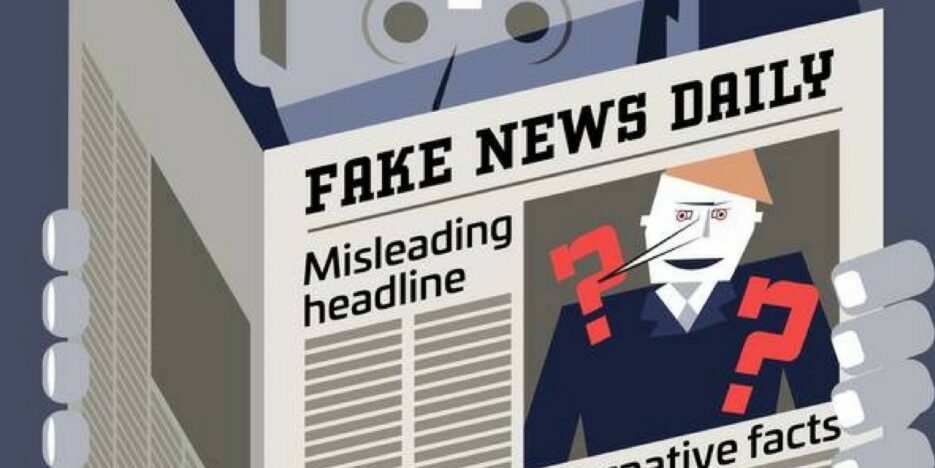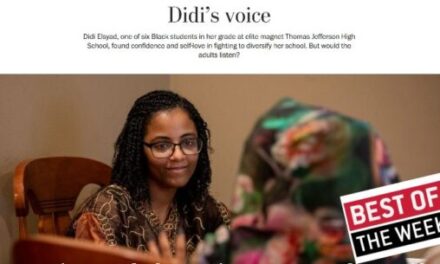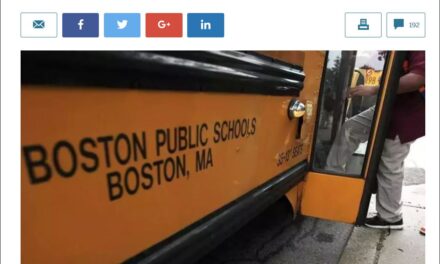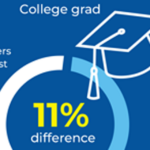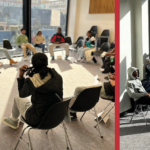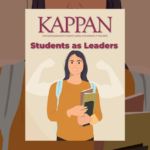Public education advocate Jennifer Berkshire and I exchange views on what ails school culture wars and education politics coverage.
By Alexander Russo
Public education advocate Jennifer C. Berkshire first came to my attention more than a decade ago when she was known as the anonymous blogger EduShyster, a moniker she has long since discarded.
Through the years, she and I have disagreed about almost everything. However, we’ve never had a feature-length discussion about education news coverage until now.
In the following interview, which was conducted electronically, Berkshire describes how school culture war coverage has been much less useful than it could be — and how political coverage has downplayed the setbacks conservative candidates and positions have experienced.
“My problem with [school culture wars] coverage is that it just hasn’t been that useful as far as helping us make sense of what all the fighting is about,” says Berkshire.
“Incendiary education chief Ryan Walters has now been the subject of multiple profiles in national outlets,” she notes. “But you’d only know that candidates allied with him just took a drubbing in Tulsa by scouring local news sites.”
While Berkshire and I may differ on many of the particulars, I appreciate her concern about media coverage of schools and her interest in enlivening the debate.
Berkshire teaches in the Boston College Prison Education Program and is the host of the education podcast “Have You Heard.” Her new book, “The Education Wars: A Citizen’s Guide and Defense Manual” (with Jack Schneider), will be out in July. You can follow her at @BisforBerkshire.
The following interview has been edited and condensed.
AR: You and I have both had issues with the past couple of years of school culture wars coverage, but from very different perspectives. I think that the coverage has been simplistic and exaggerated — a way to enrage and terrify liberal readers (and conveniently distract everyone from underlying educational problems). What’s wrong-headed or missing from that?
JCB: My problem with the coverage is that it just hasn’t been that useful as far as helping us make sense of what all the fighting is about. I think the root of the problem is that education journalists aren’t all that comfortable writing about politics while the folks who cover politics don’t know anything about education. The result is that we end up with a whole lot of school culture war stories that generate more heat than light.
AR: What’s a good example of education reporters missing the politics (or vice versa)?
JCB: Think of the wall-to-wall coverage of Moms for Liberty as a force that was going to reshape local education politics. Yet we didn’t hear nearly as much about the fact that their candidates and candidates running on similar platforms have consistently lost. Or that big ProPublica piece on the DEI official who was basically run out of town by angry white parents. To this day I’ve never seen any coverage of the fact that when those same parents ran for school board, they were defeated overwhelmingly. Oklahoma is the most recent example. Incendiary education chief Ryan Walters has now been the subject of multiple profiles in national outlets. But you’d only know that candidates allied with him just took a drubbing in Tulsa by scouring local news sites.
AR: I actually agree that the mixed (or worse) election results are something that precious few stories managed to cover. But what would have helped education reporters focus on the outcomes, or helped political reporters understand enough? What’s preventing ed reporters from noticing and mentioning that right-wing candidates were often losing?
JCB: I think that a big part of the problem is that journalists swallowed what was essentially a political argument: “parents are angry, therefore…” It became an article of faith after Glenn Youngkin’s upset win in Virginia that anger over school closures was going to be the issue that enabled the GOP to recapture the suburban women who’d fled the party during the Trump years. But that didn’t happen. Instead, you saw Republicans running on increasingly extreme education platforms and losing in one election cycle after another.
“Yet another reminder of how unpopular the GOP’s education extremism really is,” wrote Berkshire last spring. The lack of media coverage “drives me crazy!”
AR: On the issue of pandemic-era coverage, I think that our differences are clearer. You and many others seem to think that the coverage was some version of fine, reflecting parents’ and educators’ concerns and school systems’ “did-the-best-they-could” responses. I and very few others think that the coverage was weak and credulous, buying into mistaken notions and middle-class convenience.
JCB: My take on this is very different and actually relates to how the backlash to school closures was covered. We have extensive polling data showing that parents were mostly satisfied with how their schools handled the pandemic. That’s a big part of why charter schools, which are intended to be more responsive to parent demands, were actually closed for longer than district schools. But you know who was really angry about school closures? A lot of journalists and pundits. And I think that when closures were seized on by Republicans as potential election fodder, there were a lot of journalists who really related. The problem is that the things parents were supposedly really angry about kept morphing — to CRT, then to Social and Emotional Learning, then to trans kids and pronouns. Now anger over school closures is being used to justify the creation of enormous voucher programs that mostly pick up the tab for parents who already send their kids to private schools. At a certain point it ceased to make any sense at all, and yet too many journalists have continued to parrot these claims.
AR: By my count, the number of journalists who gave school closings a pass were innumerable, while those who gave it a hard look were few and far between: Kamenetz, MacGillis, Leonhardt, and I guess maybe we can include Mervosh now? And the problems I have with the “but the polls” argument is that it downplays the influence of advocates and journalists who were fear-mongering the public about in-school transmission, ignores the possibility of in-person schooling having been an option for the most vulnerable kids, and leaves out what parents might say now.
JCB: In that recent piece that Sarah Mervosh and her colleagues wrote for the New York Times on the data regarding school closures four years later, there was a quote from a parent advocate that I think really captures what you’re talking about. Sarah Carpenter, who is a prominent African American parent activist (you may remember when she and her Powerful Parent Network confronted Joe Biden and Elizabeth Warren over the Democratic Party’s waning support for charter schools), was asked about the decision to keep schools closed for so long in Memphis and I thought her response was really telling. “We wanted to survive. But I also think, man, looking back, I wish our kids could have gone back to school much quicker.” I bet that if you polled parents about their feelings about school closures today, you’d find a similar sentiment: the fear was real, and kids are paying a huge price.
“If ‘education freedom’ means the death of public school, it also likely means the death of a certain kind of education journalism,” wrote Berkshire earlier this year.
AR: On the future of education journalism, I think we agree that it’s some form of dead but we might differ on the particulars. I think it’s stuck in a traditional, system-focused mode of coverage that isn’t particularly useful to parents and doesn’t hold systems accountable for improving kids’ lives. You think… something else.
JCB: I put this question to an education journalist who I think we both respect a lot: Karin Chenoweth. And she basically said that for the last couple of decades education journalists have played a very particular role: holding public schools accountable and ideally pushing them to improve. But the problem is that there’s no improving public education if it ceases to exist, and I think that’s something that a lot of education journalists are really struggling with right now. The more ideological these battles over education become, the more of a challenge this is going to be.
I’ll give you an example. It’s increasingly apparent that a second Trump Administration will mean a dramatic rollback of the entire civil rights architecture of the 20th century. This will have profound implications for Black students, students with disabilities, and LGBTQ students. But I’ve seen almost no education coverage of this. I think what education journalists often miss is that the backlash we’re living through right now is against the idea that the state should play any role in making the country more equal. Because that’s what public schools are supposed to do, that makes them especially vulnerable. But that’s a hard story to tell if your mission is to steer clear of politics.
AR: It’s also a hard story to tell if schools haven’t done a great or even decent job of educating kids. I mean, school systems and educators like to think of themselves as the good guys, but that’s not clearly the case. If you told an intergalactic visitor about the organization, practices, and results K-12 education has achieved for generations of kids, I don’t think they’d think of it as a model or as a success.
JCB: I think that a lot of education journalists share your view, which is why so much reporting is either focused on “failure factories” or silver bullet fixes.
Now I have a question for you. One thing that drives me absolutely bonkers these days is the obsessive focus on Ivy League institutions from reporters and pundits, especially at big outlets like the Post and the Times. We get endless stories about Harvard, while the state schools that most students actually attend, and which are under incredible attack right now, get no coverage at all. Or think about somebody like a David Leonhardt, of whom I know you’re a big admirer. He’s been leading a crusade to get Ivy League schools to bring back the SAT, which has somehow become the civil rights issue of our time. What’s your take on all of this?
AR: I share your frustration with this, especially during a time when the FAFSA situation has been such a prolonged mess and so many folks are being adversely affected. Any story about elite schools is an article that’s not being written about a much larger group of schools and students. The only possible justification I’ve heard is that, as with news outlets that run a lot of Taylor Swift stories and even assign reporters to cover her every move, the Ivy League stories generate readers and subscribers that help pay for journalism in other areas. But… ugh. As Ben Casselman put it eight years ago: Shut up about Harvard.
JCB: Big surprise, but that is another issue I have a different take on. I think it’s a real problem that the New York Times and the Washington Post, in particular, are so dominated by grads of Ivy League schools. When I tell my undergrads that only 30% of Americans have bachelor’s degrees, they’re stunned because everyone they know goes to college. Well, I bet there’s something similar playing out in newsrooms where a lot of reporters and pundits don’t know anyone who didn’t go to Harvard or Yale. Not only does this give them a skewed view of the world, but it also makes them susceptible to what my friend Jon Shelton has called “the education myth” — the insistence that education is the cure for our economic woes. But I’m guessing this is something else we disagree on!
Previously from The Grade
How to cover school culture war stories? Demand concrete examples & avoid ‘emotionalism.’
Journalism should help debunk the education myth it helped create (by Jon Shelton)
Covering school extremism (by Laura Pappano)
Praise & criticism for coverage of MA’s $41M charter school ballot debate (2016)
‘Complicating the narratives’ in education journalism
Author Amanda Ripley on the lamentable rise of ‘conflict’ journalism


